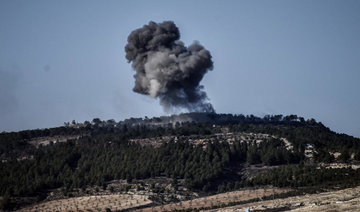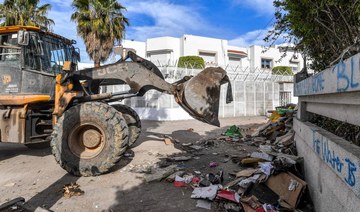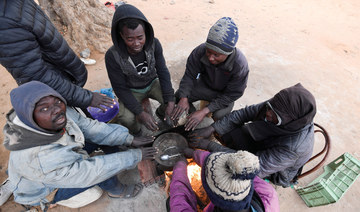ANKARA: Turkey never used chemical weapons in its operations in Syria, and takes the utmost care of civilians, a Turkish diplomatic source said, after Syrian Kurdish forces and a monitoring group accused it of carrying out a gas attack in Syria’s Afrin region.
“These are baseless accusations. Turkey never used chemical weapons. We take utmost care about civilians in Operation Olive Branch,” the source said.
Syrian Kurdish forces and a monitoring group said the Turkish military carried out a suspected gas attack that wounded six people in Syria’s Afrin region on Friday.
The source also described the accusations of wounding six civilians through a suspected gas attack as “black propaganda.”
Turkey launched an air and ground offensive last month on the Afrin region, opening a new front in the multi-sided Syrian war, to target Kurdish fighters in northern Syria.
Birusk Hasaka, a spokesman for the Kurdish YPG (people’s protection units) militia in Afrin, told Reuters that Turkish bombardment hit a village in the northwest of the region, near the Turkish border. He said it caused six people to suffer breathing problems and other symptoms indicative of a gas attack.
The Syrian Observatory for Human Rights told Reuters that Turkish forces and their Syrian insurgent allies hit the village on Friday with shells. The Britain-based war monitoring group said medical sources in Afrin reported that six people in the attack suffered breathing difficulties and dilated pupils, indicating a suspected gas attack.
The Syrian regime’s media, citing a doctor in a Afrin hospital, said Turkish shelling of the village caused choking in six people.
The claims could not be independently confirmed, and videos released from the hospital showed people being fitted with oxygen masks who did not otherwise show symptoms of gas attack inhalation such as twitching, foaming at the mouth or vomiting.
The Turkish military repeated in a weekly statement published Saturday that it does not use internationally “banned ammunition” in its Afrin operation and said, “the Turkish Armed Forces does not keep such ammunition in its inventory.”
The army also said it is careful to not harm civilians and only targets “terrorists” and their positions in the Afrin region.
On Feb. 6, the UN called for an immediate humanitarian cease-fire in Syria.
Since the onset of the conflict in 2011, the YPG and its allies have set up three autonomous cantons in the north, including Afrin. Their sphere of influence expanded as they seized territory from Daesh with US help, though Washington opposes their autonomy plans as does the Syrian regime.
US support for Kurdish-led forces in Syria has infuriated Ankara, which views them as a security threat along its frontier. Turkey sees the YPG as terrorists and an extension of the outlawed Kurdistan Workers Party (PKK) that has waged a three-decade insurgency on Turkish soil.
Turkey denies use of chemicals in Afrin, says accusations baseless
Turkey denies use of chemicals in Afrin, says accusations baseless
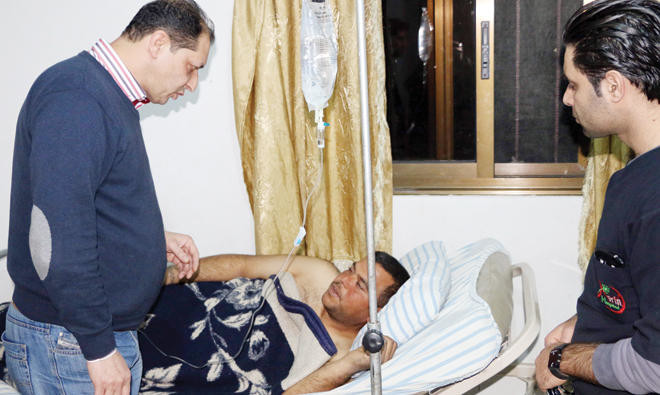
‘Substantial progress’ in Cairo talks on Gaza truce
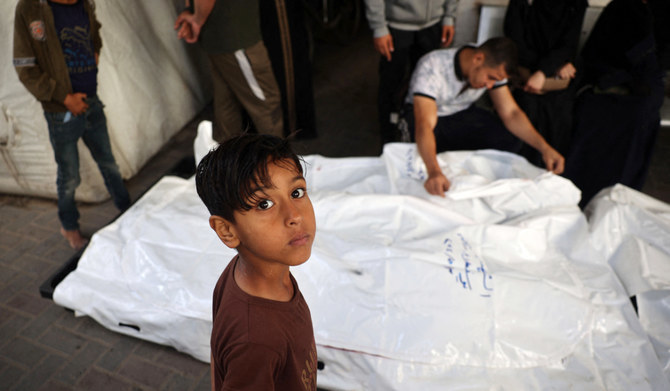
- Hamas delegation, Egyptian mediators discuss prospects for truce in war-riddled Gaza
- Israel has killed over 34,650 Palestinians in Gaza, wounded over 77,000 since Oct. 7
CAIRO: Talks in Cairo involving a Hamas delegation and Egyptian mediators have made substantial progress toward achieving a ceasefire in Gaza, according to a high-ranking source.
The source, who preferred not to be named, told Cairo News Channel that Hamas representatives and an Egyptian security delegation have reached consensus on many contentious points.
Hours before the Hamas delegation’s arrival in Cairo on Saturday, Gen. Abbas Kamel, chief of Egypt’s General Intelligence Directorate, received a phone call from the movement’s leader, Ismail Haniyeh, concerning the negotiations.
Security and political expert Ahmed Mustafa told Arab News: “According to my information, Hamas has agreed to the first phase of the ceasefire deal in Gaza.
“This includes the release of a number of hostages, with the assurance that Israel will fully withdraw from Gaza after 124 days, upon completion of the three stages of the major agreement being coordinated here in Cairo.”
Mustafa also said the Hamas delegation in Cairo is expected to inform the Egyptian side of its agreement with only minor amendments.
“I believe that Hamas has agreed on some terms with the Egyptian mediators now, and previously with the Qatari mediators under American guarantees,” he said.
However, Mustafa said that Israel’s refusal to end the war in Gaza as part of any hostage deal and its determination to eliminate what remains of Hamas remain “major points of contention.”
According to Mustafa, another point of disagreement concerns allowing the entry of dual-use materials into the enclave, for example humanitarian supplies that could also be used for combat purposes, such as fuel.
He said that the first phase, which Hamas “has tentatively agreed upon, will last up to 40 days, during which up to 33 of more than 100 Israeli hostages held in Gaza since Oct. 7 will be released.”
The second phase will last at least six weeks, with both sides agreeing to release a larger number of hostages and prisoners, and also committing to a longer halt to the fighting.
Aboud Jamal, a researcher on Palestinian affairs, told Arab News: “Hamas announced on Friday evening that settlements had been reached, and a delegation from the movement would head to Cairo on Saturday to secure an agreement in a way that meets the demands of the Palestinians.”
Jamal added: “It is clear that the coming days will witness an agreement to cease fire along with the release of some Israeli hostages.
“The only remaining issue is the stance of the Israeli government, which seems to want to prolong the war to maintain (Benjamin) Netanyahu’s government following the recent protests against him in Israel.”
Jamal said the Israeli government stands to benefit by obstructing any agreement.
“So, by sending its delegation to Cairo and discussing its agreement to terms in the prospective deal through mediators, Hamas has preempted the Tel Aviv government, a move for which the movement’s leaders are to be commended.”
He added: “It appears that Egypt truly stands with the Palestinian people and is supportive of reaching an agreement that ensures a ceasefire to save what can be saved of the lives of Gaza’s residents.
“This was evident from the statement issued by Hamas before its security delegation headed to Cairo, stating that Hamas leader Ismail Haniyeh appreciates the role that Egypt is playing.”
Australian police shoot boy dead after stabbing with ‘hallmarks’ of terrorism

SYDNEY,: Australian police said on Sunday they had shot dead a boy after he stabbed a man in Western Australia’s capital Perth, in an attack authorities said indicated terrorism.
There were signs the 16-year-old, armed with a kitchen knife, had been radicalized online, state authorities said, adding they received calls from concerned members of the local Muslim community before the attack, which occurred late on Saturday night.
The attack, in the suburb of Willetton, had “hallmarks” of terrorism but was yet to be declared a terrorist act, police said.
“At this stage it appears that he acted solely and alone,” Western Australia Premier Roger Cook told a televised press conference in the state capital Perth, regarding the attacker.
The victim, stabbed in the back, was stable in hospital, authorities said.
Prime Minister Anthony Albanese said he had been briefed on the incident by police and intelligence agencies, which advised there was no ongoing threat.
“We are a peace-loving nation and there is no place for violent extremism in Australia,” Albanese said on social media platform X.
The incident comes after New South Wales police last month charged several boys with terrorism-related offenses in investigations following the stabbing of an Assyrian Christian bishop while he was giving a live-streamed sermon in Sydney, on April 15.
The attack on the bishop came only days after a stabbing spree killed six in the Sydney beachside suburb of Bondi.
Gun and knife crime is rare in Australia, which consistently ranks among the safest countries in the world, according to the federal government. (Reporting by Sam McKeith in Sydney; Editing by Christian Schmollinger and William Mallard)
Saudi business delegation to arrive in Pakistan today to explore investment opportunities
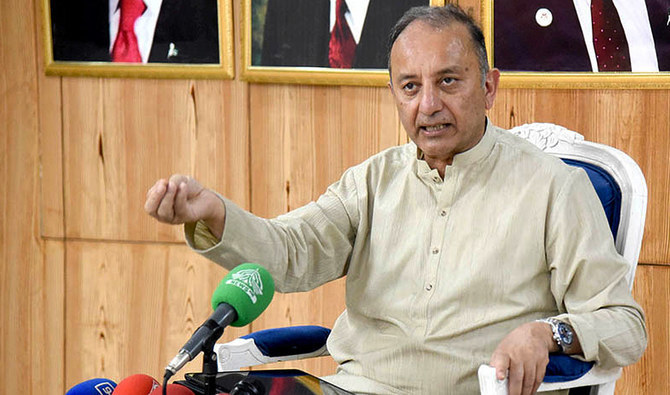
- Saudi deputy investment minister, representatives of 30-35 Saudi companies part of delegation, says Pakistani minister
- Saudi Arabia recently reaffirmed its commitment to expedite investment package for Pakistan worth $5 billion
ISLAMABAD: A high-level Saudi business delegation led by the Kingdom’s deputy investment minister will arrive in Pakistan today, Sunday, to explore investment opportunities in various economic sectors, Federal Minister for Petroleum Musadik Malik confirmed a day earlier.
Pakistan and Saudi Arabia, who enjoy fraternal ties rooted deep in shared culture, religion and economic cooperation, have witnessed a flurry of official visits in recent weeks. Saudi Foreign Minister Prince Faisal bin Farhan traveled to Islamabad earlier in April before Prime Minister Shehbaz Sharif’s two-day visit to the Kingdom to attend a World Economic Forum meeting where he met Saudi officials.
“The Saudi Deputy Investment Minister is visiting Pakistan tomorrow,” Malik, who is also the focal person for Saudi-Pak bilateral collaboration, told reporters at a news conference in Lahore on Saturday.
“He is bringing representatives from 30 to 35 companies whose CEOs are coming here.”
The Pakistani minister maintained his country had always cherished cordial ties with the Kingdom, though it had not managed to turn this “relationship of friendship into a relationship of stability and progress.”
He said Pakistan mostly discussed its financial concerns with the Saudi authorities and requested their support. However, the present government wanted to change that by focusing its bilateral conversations on mutually beneficial progress and development, not aid and assistance.
The minister said the two sides discussed a new refinery project during the recent engagements that would be used for export purposes to earn foreign revenue. Additionally, food security was also discussed to further strengthen Pakistan’s agricultural sector.
He informed that Prime Minister Sharif wanted the country’s “private sector to take the lead on this path to progress.”
“That is why Saudi investors have been invited to come here,” he continued. “They will sit with Pakistani companies and figure out ways to connect the Pakistani talent with the capital and investment needed at the international level for the IT revolution.”
Malik said the bilateral collaboration would primarily benefit small businesses, particularly the technology companies established by young students who were likely to get a significant amount of investment from Saudi entrepreneurs.
He expressed optimism that chemical, energy and agricultural companies would also gain an advantage from the ongoing bilateral collaboration between the two sides.
Apart from Pakistan and Saudi Arabia’s fraternal ties, the Kingdom is particularly important to Islamabad as it is home to over 2.7 million Pakistani expatriates and serves as the top source of remittances to the cash-strapped South Asian country.
Both Pakistan and Saudi Arabia have been closely working to increase bilateral trade and investment deals, and the Kingdom recently reaffirmed its commitment to expedite an investment package worth $5 billion.
Pakistan urges Hajj pilgrims to get vaccinated five days before departure to Saudi Arabia
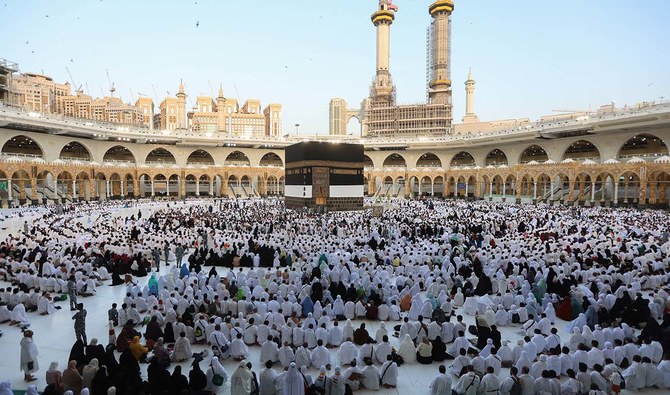
- Pakistani pilgrims require to vaccinate themselves against meningitis, seasonal influenza and polio
- The vaccinations are done at Hajji camps during the day in all major cities around the country
ISLAMABAD: Pakistan’s religious affairs ministry on Saturday asked Hajj pilgrims to get themselves vaccinated at least five days before departure to Saudi Arabia to avoid inconvenience.
Hajj pilgrims must comply with strict vaccination requirements set by the Saudi Ministry of Health to ensure public safety during one of the world’s largest annual gatherings.
Mandatory vaccines include the meningitis shot, with additional recommendations for the seasonal influenza vaccine, while travelers from regions prone to yellow fever and polio must also provide corresponding immunization certificates.
These precautions are vital to prevent the spread of infectious diseases among millions of pilgrims converging in the kingdom from across the globe.
“The intending pilgrims are advised to visit their respective Hajji camps five days (from 9 am to 5 pm) before their flight to receive vaccination against meningitis, seasonal influenza and polio, besides obtaining a yellow card,” the state-owned Associated Press of Pakistan (APP) news agency quoted a statement issued by the ministry.
“This is a mandatory requirement,” it added.
Hajj is one of the Five Pillars of Islam, which include the core beliefs and practices every Muslim is expected to follow.
The pilgrimage is required to be performed at least once in a lifetime by all adult Muslims who meet the necessary conditions of health and financial stability to travel to and perform the rituals in Makkah.
Pakistan plans to launch the special Hajj flight operation from May 9 that will continue until June 10.
Tunisian town gripped by exodus of youth seeking better life in Europe
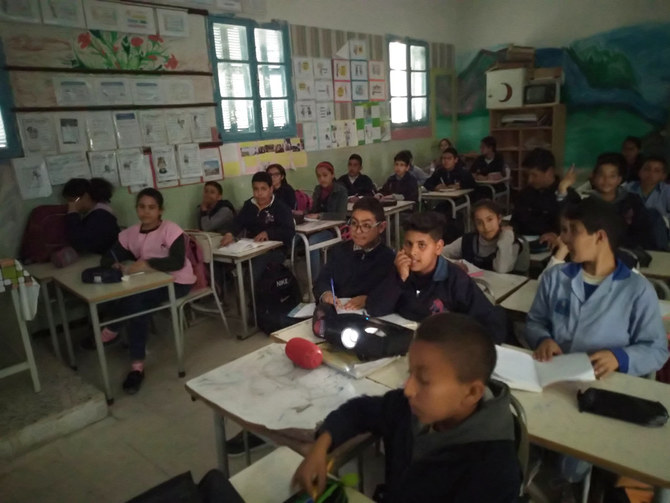
- The struggling town of El Hencha is just 150 kilometers from the Italian island of Lampedusa, a gateway for migrants to Europe
EL HENCHA, Tunisia: When Mohamed Lafi vanished at sea one fateful night, it marked yet another tragedy for a Tunisian town struggling with the exodus of its youth.
Mohamed’s disappearance adds to the deepening despair in El Hencha, situated just 150 kilometers (90 miles) from the Italian island of Lampedusa.
His sister, Ines, stayed behind, confronting the harsh reality that many families face as their loved ones risk everything in search of a better life in Europe.
Mohamed, a 30-year-old taxi driver, left home on the night of January 10 with little more than his mobile phone.
“He went without saying anything to my parents, without a change of clothes, or a bag,” said Ines, 42.
It seemed as though he “was going to meet his friends,” she said.
Mohamed was one of 40 would-be migrants who had boarded a boat — all Tunisians aged between 17 and 30, including a woman and her four-month-old baby.
Despite adverse weather conditions and rough seas, they were determined to set sail, their families said.
More than 1,300 migrants died or disappeared last year in shipwrecks near the Tunisian coast, said the Tunisian Forum for Social and Economic Rights (FTDES) non-governmental organization.
In 2023, Tunisians accounted for the second largest number of irregular migrant arrivals in Italy, at 17,304 people, second only to Guineans at 18,204, Italian government official figures show.
The European Union signed an agreement last year to provide financial aid to debt-ridden Tunisia in return for its commitment to curb migrant departures.
The sense of hopelessness is palpable in Tunisia, whose economy is stagnant with only 0.4 percent of growth in 2023 and unemployment hovering around 40 percent.
The north African country has also been shaken by political tensions, after President Kais Saied orchestrated a sweeping power grab in July 2021.
Those missing from El Hencha, mainly from the middle class, shared a grim outlook for the future, said FTDES.
“Irregular migration cannot be explained only by economic and social factors,” said Romdhane Ben Amor, spokesman for the rights organization.
“The political factor and the feeling of despair of Tunisians who don’t believe in the future of the country” also play a significant role, he added.
Meftah Jalloul, the father of another young migrant, was aware of his son Mohamed’s longing to cross the Mediterranean for a brighter future.
The 62-year-old fishmonger had pleaded with Mohamed to wait for better weather before embarking on his journey.
But the 17-year-old, intent on making the perilous voyage, simply kissed his father on his head and left.
“He wanted money to migrate,” said Jalloul, taking responsibility for providing the funds.
With daily earnings of 20 dinars (about $6), Mohamed Lafi was left with little prospects for building a stable future, said his sister Ines.
“He was unable to make plans or build a house or get married,” she lamented.
Yousri Henchi, a 22-year-old migrant, dropped out of high school and earned a meagre income of 10 to 15 dinars a day working at an Internet cafe.
His uncle, Mohamed Henchi, attributed the allure of Europe to frustrated youths like Yousri being influenced by successful migrants who shared their experiences on social media.
“They see that and want to change their future. They see Europe as a paradise,” he said.
Jalloul had sought to persuade his son, who also quit high school, to undergo vocational training and migrate legally to Italy, France, or Germany.
“He shouldn’t have left without skills or qualifications,” he said. “He could have learnt a trade — plumbing, carpentry, or mechanics.”
Jalloul clings to the hope that the boat Mohamed boarded drifted toward neighboring Libya, although searches there by family contacts have yielded no leads.
“Four months have passed and I am still crying for my son,” he said, overcome with emotion.
Ines Lafi expressed anger toward the person who smuggled her brother’s group, a figure well-known in El Hencha for facilitating clandestine crossings to Italy.
“He had always come back here, but this time, he disappeared without a trace.”
The families have urged Tunisian authorities to bolster economic conditions, educational programs and cultural activities in the town of around 6,000 people to encourage youths to stay.
“We must enhance the industrial zone and create job opportunities for young people,” said Henchi.


